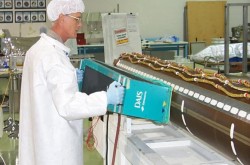The Next 150 Years of Canadian Youth Innovation
This article was originally written and submitted as part of a Canada 150 Project, the Innovation Storybook, to crowdsource stories of Canadian innovation with partners across Canada. The content has since been migrated to Ingenium’s Channel, a digital hub featuring curated content related to science, technology and innovation.
The Next 150 Years of Canadian Youth Innovation
18 MAY 2017
Happy Youth Innovation Day.
Earlier this week, Michele Romanow visited the League office to film the Next Level with another great Canadian entrepreneur, Mike Serbinis. It immediately conjured back memories of my favourite Tech T.O. talk ever.
Why is it my favourite? Michele reveals how she accelerated her career so quickly and calls out the three worst words a young professional can hear, but ones I’ve heard in so many workplaces. The kiss of death: “You’re. Not. Ready.”
The biggest thing for me was I didn’t wait. There’s this conventional wisdom out there that you need two years or x number of time of experience to really learn something, and I think that’s bull. You can learn very, very quickly. So if you’re ambitious, and you want to become an entrepreneur, what do you do? I think you get training from a really great entrepreneur. - Michele Romanow
She goes on to say that school doesn’t teach you how to be an entrepreneur - it teaches you how to be perfect. But there’s one problem with that. None of us are, or ever will be, perfect.
Entrepreneurship is one of the most non-linear career paths there is, and something I didn’t have exposure to until late in my undergrad. The practice, by its very nature, is full of twists and turns, constant iteration and execution. The best entrepreneurs don’t wait until something is 100% ready. They aim for 60% and figure out the rest later. There’s no handbook, professors, or tutorials. It’s you, your idea, your team, and your conviction.
My have we come a long ways in 150 years.
I think some of the coolest things about our country is that we are:
Free.
Diverse.
Educated.
You can’t say that about everywhere in the world. My family’s background is Ukrainian - my grandmother immigrated to Canada in 1945, like so many others at that time. This idea of searching for a better life; of starting from nothing to build something big and strong and beautiful, is literally woven into the DNA of our country. So it should come as no surprise why so many of our country’s great entrepreneurs are first or second generation immigrants. They all harness the power of vision, grit, and ambition, and apply that to whatever industry or domain they’re experienced in, or passionate about transforming. The result is a unique form of magic - a combination of art & science that is a reflection of the Founder and what they believe to be true.
In a country with such diverse ethnic backgrounds, experiences and educational disciplines, more young people are graduating with university educations than ever before. While the dilution of an undergrad education is causing some economic problems, it’s shown how far we’ve come as a country that such a level of education has become table stakes. As we look on to Canada 150, what are the big challenges and opportunities for growth that we face as a nation?
Big Challenges, Bigger Opportunities
Digital Literacy
In Grade 12, I remember having to choose between taking computers and learning advanced Java, or another year of French. In hindsight, I’m glad I went with the former. Coding has become the third language every Canadian should learn as soon as elementary school (in addition to French!) Even if you don’t envision building tech on product teams, there’s a huge competitive advantage in being able to read a block of code, understand it, and communicate it to other stakeholders. It’ll help you become a better marketer and businessperson. Luckily, we have awesome nonprofits like Ladies Learning Code and newly accredited colleges such as HackerYou that are enabling digital literacy to various age groups across Canada.
Financial Literacy
According to a PwC report, only 8% of millennials have a high degree of financially literacy. Nearly half wouldn’t have 5,000 on them for an emergency, under a third overdraw on their chequing accounts, and over 50% carry a credit card balance in the last twelve months. Yikes. Investing and taxes is something else you don’t learn in university, but is paramount in setting you up to achieve long-term goals in life. Things like buying a car, saving up for a house, etc. Oh wait. In all seriousness, knowing what percent of your income to invest, what percent you should spend on housing, and the difference between a GIC and a TFSA will pay dividends in the long-run. Why spend $200 a year on bank fees when you can get that in interest from Tangerine? Why not open a simple, automated investing account with Wealthsimple and watch your savings actually grow? Launching your career as an entrepreneur isn’t so easy when you’re saddled with $25K of student debt.
Self Literacy
We’re finally starting to have a real discussion around mental health, but we need to do more than remove stigma in our workplaces. According to Ipsos, a staggering 63% of millennials are at “high risk” of mental illness, higher than any other group in the country. Why? Because this optimistic, aspirational generation is met with cold, hard reality. Crowded job markets, stagnant incomes, rising cost of living in major urban centres, and big transitions are just part of the equation impacting this demographic’s mental health. If you feel you’re suffering from depression, anxiety, or some other mental health issue, don’t be a hero - try therapy. Online resources like TranQool make it easy to connect with the right professional help in the comfort of your living room. We’re not there yet, but I believe we’re well on our way to making strides in reducing stigma, diagnosing, and treating mental health more effectively.
The Next 150
Equal Playing Field
It’s no secret that tech has a diversity problem. Only 1% of all female founders have used venture capital to fund their businesses, many still citing sexism and alpha-type cultures in all realms of the startup world. It honestly blows my mind that this still exists in 2017. The good news is that we’re starting to see more programs, incubators and investment funds focused on providing support exclusively to women entrepreneurs. Communitech’s Fierce Founders program and BDC’s Women in Tech initiative are just a few of the programs offering these kinds of progressive supports. True progress will have been made, however, when these kinds of exclusive programs are no longer needed. Our goal should be to change the culture in the next 5-10 years, and create an environment in which women feel comfortable, empowered, accepted, and competitive.
Entrepreneurship as a career path
If you’re a hockey player, you play hockey. If you’re good at math, you become an accountant. If you like to build things, you should be able to. Ten years ago, this was still relatively taboo. Now, the list of support systems and resources is endless. Nearly every university in Canada has some sort of incubator or entrepreneurship program, though only a few are doing it really well.
Venture For Canada places recent graduates at Canadian startups to gain two years of relevant, full-time work experience. Junior Achievement’s Company Program gives high school students practical experience building a venture in a collaborative environment, while DECA Ontario provides many of these same students with case competitions to build their business skills & maturity. Impact! builds leaders in sustainability & social enterprise, while Girls E-Mentorship connects at-risk girls with female business champions. The list goes on and on.
The Infinite Loop
It’s hard to believe that it’s been 3 years ago that I picked up the book that changed my life. It’s a very simple idea: If you find your passion and purpose, pay it forward, and transcend your industry, you can achieve immense success and it’ll in some way be paid back to you. This idea of learning from the best, helping others who were once in your position, giving back to your community is something that’s incredibly powerful, but something that’s still not entirely well understood. Only 1/3 of all entrepreneurs in Canada are mentoring young ones. I built this business because I fundamentally believed we could change that.
Ryan Holmes is someone who gets it. The Next Big Thing Foundation has supported over 3 cohorts of young entrepreneurs who have raised over $8M and created 90+ jobs. That’s the power of real mentorship.
Canada can become an innovation-based economy. We must, to continue to grow the country’s long-term prosperity. But to me, that’s just the result of solving a ton of cool problems that are out there, in our own back yard. Innovation is officially on the map with Justin Trudeau’s $800M innovation budget. Where we go from here is only limited by:
Imagination. Determination. Ambition. What will you build?
Frontman & CEO @ Rockstar Café. Marketing @ League. Next 36 & UWaterloo alum. Cottager. Coach. Springsteen enthusiast. Passionate about helping build the next generation of Canadian entrepreneurs.
Toronto / Kitchener-Waterloo https://rockstar-cafe.ca
Transcript
This was first presented at the January 2017 TechTO. In this presentation, Michele shares stories of her startup past and what changes are ahead for the technology community. What do you think of what Michele had to say? Tell us by leaving a comment.
















